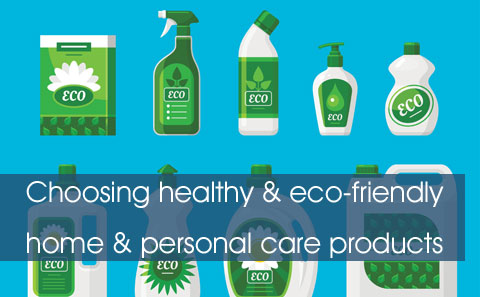Cleaning products, detergents, liquid soaps, shampoos, sunscreens and cosmetics can all potentially contain chemicals harmful to health or for the environment (especially to aquatic life, where these products usually end up). But their ecological impact can be even greater at the source, in the way ingredients are grown or extracted.
Palm oil is a major component of most cleaning products, detergents, body soaps, shampoos and toothpastes. You will find it in the ingredients under the names sodium laureth sulfate, sodium lauryl sulfate, stearic acid, glyceryl or octyl palmitate, just to name a few (there are over 100 chemicals derived from palm trees). Most often even these names are hidden behind the more generic 'anionic surfactants' (see below). Palm plantations are one of the biggest drivers of tropical rainforest deforestation, especially in Indonesia and Malaysia, which produce over 80% of the world's palm oil. If you don't want to sponsor deforestation and the loss of biodiversity and extinction of species linked to it, it is essential to choose either products that do not contain palm oil or companies that source their palm oil responsibly in sustainable plantations.
Plastic pollution is another global concern. It is our responsibility as consumers to recycle plastic containers. But manufacturers can also do their part by using recycled plastic for their bottles in the first place, which limit even more plastic consumption.
Finally, all manufacturing has a carbon footprint. Some companies are doing more than others to limit their impact, be it by using 100% renewable energy or planting trees to offset their emissions. A few have even managed to become carbon neutral.
Read the article is here: Choosing healthy and eco-friendly personal care and home care products

Palm oil is a major component of most cleaning products, detergents, body soaps, shampoos and toothpastes. You will find it in the ingredients under the names sodium laureth sulfate, sodium lauryl sulfate, stearic acid, glyceryl or octyl palmitate, just to name a few (there are over 100 chemicals derived from palm trees). Most often even these names are hidden behind the more generic 'anionic surfactants' (see below). Palm plantations are one of the biggest drivers of tropical rainforest deforestation, especially in Indonesia and Malaysia, which produce over 80% of the world's palm oil. If you don't want to sponsor deforestation and the loss of biodiversity and extinction of species linked to it, it is essential to choose either products that do not contain palm oil or companies that source their palm oil responsibly in sustainable plantations.
Plastic pollution is another global concern. It is our responsibility as consumers to recycle plastic containers. But manufacturers can also do their part by using recycled plastic for their bottles in the first place, which limit even more plastic consumption.
Finally, all manufacturing has a carbon footprint. Some companies are doing more than others to limit their impact, be it by using 100% renewable energy or planting trees to offset their emissions. A few have even managed to become carbon neutral.
Read the article is here: Choosing healthy and eco-friendly personal care and home care products

Last edited:

